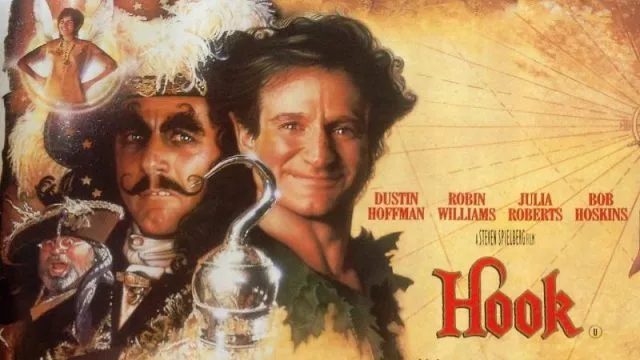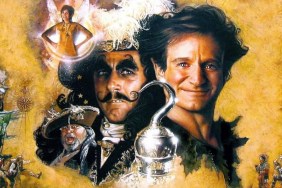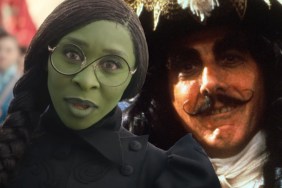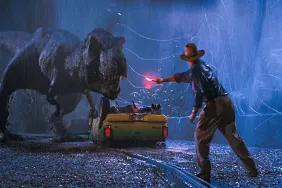Steven Spielberg’s Hook recently turned 30 and remains one of those movies that I appreciate as an old-fashioned nostalgic bit of pop culture from my youth, even if I don’t quite love it like I used to.
From a critical perspective, Hook isn’t a very good film. At a massive 142 minutes, it’s far too long for a family adventure that owes more to The Goonies than, say, E.T. the Extra-Terrestrial. The special effects are surprisingly dated, particularly when compared to other releases of the era, notably James Cameron’s Terminator 2: Judgment Day, and the story, in which a grown-up Peter Pan must return to Neverland to take on Captain Hook, never fully comes together in a satisfying manner.
MORE: Everything Revealed at The Game Awards 2021
Really, though, the problem with Hook is Spielberg himself. Sure, the film boasts his signature visual flourishes, humor, and overtly theatrical directing style, but the beating heart at its center feels artificial, driven more by marketing than a yearning to tell a grand story.
That’s understandable. At this point in his career, the Beard was at an impasse, wrestling with a desire to produce more adult-driven features such as The Color Purple and Empire of the Sun and living up to his name as the world’s greatest blockbuster filmmaker. The rebellious young man who nearly killed himself making Jaws had, as articles exclaimed at the time, grown-up, replaced by a 41-year old father who was no longer in sync with his inner child.
Indeed, there’s a certain desperation in Hook, from the surreal, overstuffed production design to the army of Lost Boys who mostly skateboard and play basketball despite living on a fantasy island boasting pirates, topless mermaids, and fairies. You can practically hear Spielberg asking, nay, pleading, “Kids still like skateboarding, right?”
Yet, while cynically crafted, Hook certainly swings for the fences — a sprawling epic with grand heroes and villains, massive spectacle and big emotions — and ultimately feels like the final chapter to Spielberg’s batch of “reckless pictures,” namely Jaws, Close Encounters of the Third Kind, 1941, and Indiana Jones and the Temple of Doom; all of which were similarly ambitious productions that cost a fortune and, in some cases, spiraled out of control.
In other words, despite its many noticeable flaws, in particular its contradictions to J.M. Barrie’s source material, sluggish pacing, and a messy third act that favors sentiment over logic — did Peter Pan really leave all of those orphan kids back in Neverland? — Hook has enough Spielbergian wonder to entertain younger audiences all these years later.
MORE: It’s Jets vs. Sharks in the West Side Story Special Look Teaser
For starters, the picture feels like an old fashioned Hollywood production, replete with massive sets, elaborate costumes and a herd of extras. Watch this sequence, perhaps the best in the film, and tell me it doesn’t remind you of a grand ole musical:
There’s also the moment where Peter learns to fly again, a sequence that still gives me goosebumps to this day. Granted, that’s mostly due to John Williams’ magical score:
There’s also the big food fight, one of my favorite scenes in any film, mostly because of how it escalates and ends on a moment of dramatic tension as Rufio chucks a coconut at Peter, who instinctively slices it in two:
I always loved Peter’s appearance on Captain Hook’s ship in the third act as well, even if the ensuing battle doesn’t quite live up to the hype:
As for the performances, Dustin Hoffman’s titular Captain Hook is a mixed bag. In the film’s brilliant early sequences, he’s presented as this ghostly, even frightening apparition:
Except, when we finally see him, Hook comes across more like a big, dumb kid than a threatening villain, which I suppose was the point. Except, Dustin Hoffman is giving one of those “look how much fun I, an A-list talent, am having in this goofy kid comedy” type of performances that feels more caricature than character:
Robin Williams, on the other hand, is perfectly cast and suited for the material. In fact, he’s the only one who seems to understand what movie he’s in. The late actor handles the uptight lawyer bits surprisingly well and then, later, as Peter Pan, clearly has a blast essentially playing a big kid:
Julia Roberts never landed for me as Tinkerbell, partially because my mom always made fun of her performance — “Come on, give him a chance!” — but mostly because the writers are all over the place with her character.
To be fair, you can’t have Julia Roberts flying around with nothing to say or do, which is probably why they threw this curious bit in there:
Otherwise, Rufio, with his red and black mohawk, amber-colored sword, and gives-no-s—- attitude, was always cool:
And, despite my misgivings, the main Lost Boys are actually quite great, even if they are only given the thinnest of characterizations.
Charlie Korsmo and Amber Scott are memorable in their respective roles as Jack and Maggie, though they don’t have much to do once they arrive in Neverland. Maggie Smith is terrific in her all-too-brief cameo as Granny Wendy and Bob Hoskins is perfectly cast, but likewise has little to do as Smee.
Still, stuffed between all of the good bits are curious bits that leave you scratching your head. The entire opening act establishes Peter as a blowhard because he … wait for it … works too much? Peter flies his family to friggin’ London, yet, his wife chastises him when he goes berserk after botching a million-dollar deal that would likely add more dollars to the ole bank account and allow Jack and Maggie to go to college. What’s the message here? Would Moira rather Peter not work and spend more time with the family as they fight and claw for food?
The final battle between Pan and Hook is surprisingly flat, mostly due to the old-school aesthetic. Spielberg leans heavily on in-camera effects, which negatively impacts the flying bits. You never get a sense that Peter Pan can take off and fly at any given moment, and the numerous cuts between his performance and the stuntmen whenever Peter flips or leaps off the ground are distracting and never fully convincing.
Watch the first part of this clip in which Peter flies towards Hook. Robin Williams takes off, then the shot cuts and has him land. For a production as expensive as Hook, it’s weird they weren’t able to figure out how to do this shot in one take. Even as a kid that slight cut bothered me.
Finally, Hook is never really sure what it wants to be. A deep drama about adults rediscovering the magic of childhood or a goofy comedy about a suicidal pirate and an uptight lawyer engaging in war? My guess is Spielberg originally set out to make the drama, but panicked amid cost inflations and studio pressures and reverted to a more simplistic, comedic tone.
As such, Rufio’s dramatic and shocking death quite literally comes out of nowhere. One second, Thud Butt is rolling down a plank like a bowling ball and smashing a pirate’s testicles with a board, and the next, a young man is quite literally stabbed in the heart and murdered by Captain Hook. Even more bizarre, no one seems to react to this moment in a realistic manner. None of the characters reference Rufio again. Peter just leaves his body on Hook’s ship and flies away as though the event never occurred. Did the Lost Boys carry Rufio’s corpse from the ship? Did Hook and Peter trample over Rufio when they were fighting?
Again, I’m pretty sure Hook was originally intended to be a dramatic fantasy that adhered closer to Barrie’s Peter Pan, and likely Spielberg’s own E.T. That’s all speculation, of course, but if you squint, you can certainly see a darker, smaller, more intimate story lurking beneath the extravagance.
Now, before you attack me for criticizing your favorite film, keep in mind I grew up watching Hook. I had the toys, the soundtrack, the novelization, the teaser poster. I saw it with my friends on opening day right after a trip to Chuck E. Cheese, and I vividly recall delivering a rave review to my parents. (My dad got mad because I spoiled Rufio’s death.) Back in 1991, Hook was the movie of the year. A wondrous fantasy unlike any I had seen to that point, bursting with magic, humor, and heart. It was wondrous.
Now that I’ve grown older, that magic has indeed diminished, exposing an enjoyable, though flawed film. I will always carry a fondness for Spielberg’s take on Peter Pan, mainly because I remember how it made me feel as a kid, but have come to grips that it could have, nay, should have been a lot better.
Then again, sometimes I wish I had never grown up.










